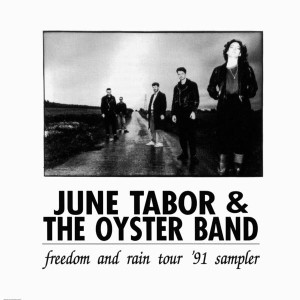 If it can be said that the tour programmes such as the one done for Steeleye Span’s 40th Anniversary Tour 2009 are ephemera, as they are one-offs that virtually are unobtainable after the tour ends, then the radio world has another sort of ephemera that are also one-offs, such as the CDs done for DJs that are never intended to be sold even on the grey market of the Internet. Such is what we have here. It’s not the best representation of that tour, as that’s without doubt the full soundboard recording of a Minneapolis concert that I’ll be reviewing shortly.
If it can be said that the tour programmes such as the one done for Steeleye Span’s 40th Anniversary Tour 2009 are ephemera, as they are one-offs that virtually are unobtainable after the tour ends, then the radio world has another sort of ephemera that are also one-offs, such as the CDs done for DJs that are never intended to be sold even on the grey market of the Internet. Such is what we have here. It’s not the best representation of that tour, as that’s without doubt the full soundboard recording of a Minneapolis concert that I’ll be reviewing shortly.
A bit of background first. This tour was done around their Freedom and Rain recording, which was the first time the band has collaborated with June Tabor, the second being done the Ragged Kingdom recording nearly twenty years later. And yes, there were some superb soundboard recordings done during that tour as well.
Part of the recording was drawn from the the Freedom and Rain recording but some of it was live, possibly drawn off the Minneapolis recording that I previously noted. Our reviewer of the Freedom and Rain recording noted that this is an ‘impossibly rare EP’ and at that time was the only recording available of the band and Tabor performing Jefferson Airplane’s ‘White Rabbit’ and ‘Somebody to Love’. It also included a live performance of Bob Dylan’s ‘All Along the Watchtower’. The first two have Tabor sounding eerily like Grace Slick, the later has her doing what I think is the best version of the song, with the band adding a macabre touch to the song.
The studio recorded material here includes such gems such as Richard Thompson’s ‘Night Comes In’ and Lou Reed’s ‘All Tomorrow’s Parties’ to name my favourites. It’s a radio-friendly selection, nothing overtly political and no foul language, in keeping with when it was released (unlike later releases when ‘The Shouting End of Life’ song would see John Jones yelling ‘Go Fuck Yourself’).
Again I will stress that the full performance recording from the Minneapolis performance is your best bet for seeing what Tabor and the Oysterband were like nearly twenty-five ago. Ironically, the second collaboration actually resulted in a much stronger studio recording.
(Rykodisc, 1991)
